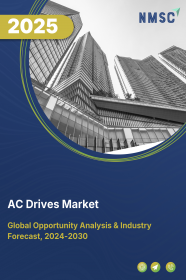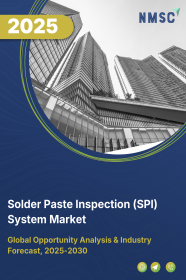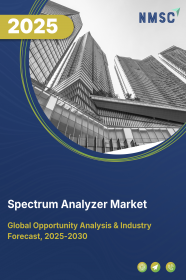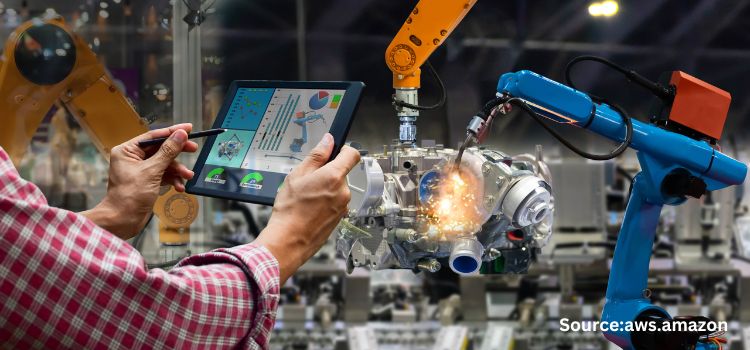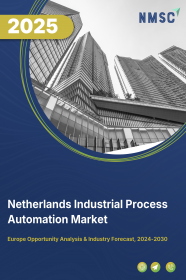
Netherlands Industrial Process Automation Market by Component (Manufacturing Execution System (MES), Distributed Control System (DCS), Programmable Logic Control (PLC), Supervisory Control & Data Acquisition (SCADA), Field Instruments, Industrial Robots, and Process Analyzers and Drives), and by End-User (Oil & Gas, Chemical & Refining, Energy & Power, Pulp & Paper, Metals & Mining, Pharmaceutical, Cement & Glass, and Others) – Opportunity Analysis and Industry Forecast, 2024–2030
Industry: Semiconductor & Electronics | Publish Date: 17-Feb-2025 | No of Pages: 123 | No. of Tables: 89 | No. of Figures: 54 | Format: PDF | Report Code : SE987
US Tariff Impact on Netherlands Industrial Process Automation Market
Trump Tariffs Are Reshaping Global Business
Netherlands Industrial Process Automation Market Overview
The Netherlands Industrial Process Automation Market size was valued at USD 438.3 million in 2023, and is predicted to reach USD 624.4 million by 2030, at a CAGR of 4.6% from 2024 to 2030.
The industrial process automation industry focuses on providing technologies and systems designed to monitor, control, and optimize industrial operations. It involves the use of advanced computer technology, hardware, and software to automate essential processes such as inventory management, manufacturing, production, and quality control.
Key technologies in this market include sensors, programmable logic controllers (PLCs), human-machine interfaces (HMIs), and supervisory control and data acquisition (SCADA) systems. Industries such as oil and gas, chemical processing, food and beverage, and pharmaceuticals rely heavily on automation to improve efficiency, enhance product quality, and ensure workplace safety.
By lowering operational costs and reducing human errors, automation software enables companies to streamline their production processes and achieve higher output with greater accuracy.
As businesses strive to boost productivity and stay competitive in an increasingly automated global manufacturing environment, the demand for industrial IoT solutions continues to grow.
Power and Energy Demand Boosting Automation Adoption
The industrial process automation market in the Netherlands is strongly shaped by the increasing demand for power and energy, largely driven by energy-intensive industries such as chemicals, refineries, and metallurgy. These industries rely on advanced automation technologies to enhance efficiency and minimize operational costs.
In addition, significant investments by the government in research and development are opening up new opportunities to optimize industrial processes, further accelerating the adoption of automation across key sectors.
Automotive Industry Growth Driving the Need for Advanced Automation
The Netherlands holds a strategic position in the global automotive industry, with vehicle sales showing substantial growth. The rise in automotive production places increased the Netherlands industrial process automation market demand to maintain productivity levels.
Efficient automation solutions are becoming essential for manufacturers to optimize production lines, meet growing demand, and remain competitive in the evolving market. The presence of High-Tech Campus Eindhoven, housing over 220 companies focused on developing advanced technologies, further fuels innovation in the industrial process automation sector, supporting the market's continued expansion in the Netherlands.
Lack of Standardization Hinders the Growth of Industrial Process Automation Market
The lack of standardization is a major challenge that can limit the Netherlands industrial process automation market expansion. Without common standards, vendors may develop proprietary systems that are hard to replace or upgrade. This can result in vendor lock-in, where companies become dependent on a specific vendor’s technology, restricting their ability to switch to other vendors.
Vendor lock-in often leads to increased costs, reduced flexibility, and less innovation, that negatively affect the market growth. Companies might hesitate to invest in automation systems if they are worried about being tied to one vendor’s technology, further slowing market expansion.
Industry 4.0 Technologies Paving the Way for Future Automation Opportunities
The progress in industry 4.0 technologies, including the internet of things (IoT), cloud computing, and artificial intelligence (AI), is generating considerable opportunities for the Netherlands industrial process automation market.
These advancements enable companies to gather and analyze vast amounts of data in real time, offering critical insights into their operations and identifying areas for improvement. As technology continues to advance, industry participants are partnering with tech-focused firms to create new solutions based on established technologies.
Competitive Landscape
Several market players operating in the Netherlands industrial process automation industry include Siemens AG, Honeywell International, Schneider Electric, Mitsubishi Electric, Rockwell Automation, Emerson Electric Co., ABB Ltd., Omron Corp., Fanuc Corp., Toshiba Corp., and others.
Netherland Industrial Process Automation Market Key Segments
By Component
-
Manufacturing Execution Systems
-
Hardware
-
Software
-
Services
-
-
Distributed Control Systems
-
Hardware
-
Software
-
Services
-
-
Programmable Logic Control
-
Hardware
-
Software
-
Services
-
- Supervisory Control and Data Acquisition (SCADA)
-
Hardware
-
Software
-
Services
-
-
Field Instruments
-
Industrial Robots
-
Process Analyzers & Drives
By End-User
-
Oil & Gas
-
Chemical & Refining
-
Energy & Power
-
Pulp & Paper
-
Metals & Mining
-
Pharmaceutical
-
Cement & Glass
-
Others
Key Players
-
Siemens AG
-
Honeywell International
-
Schneider Electric
-
Mitsubishi Electric
-
Rockwell Automation
-
Emerson Electric Co.
-
ABB Ltd.
-
Omron Corp.
-
Fanuc Corp.
-
Toshiba Corp.
REPORT SCOPE AND SEGMENTATION:
|
Parameters |
Details |
|
Market Size in 2023 |
USD 438.3 Million |
|
Revenue Forecast in 2030 |
USD 624.4 Million |
|
Growth Rate |
CAGR of 4.6% from 2024 to 2030 |
|
Analysis Period |
2023–2030 |
|
Base Year Considered |
2023 |
|
Forecast Period |
2024–2030 |
|
Market Size Estimation |
Million (USD) |
|
Growth Factors |
|
|
Companies Profiled |
10 |
|
Market Share |
Available for 10 companies |
|
Customization Scope |
Free customization (equivalent up to 80 working hours of analysts) after purchase. Addition or alteration to country, regional, and segment scope. |
|
Pricing and Purchase Options |
Avail customized purchase options to meet your exact research needs. |

















 Speak to Our Analyst
Speak to Our Analyst



